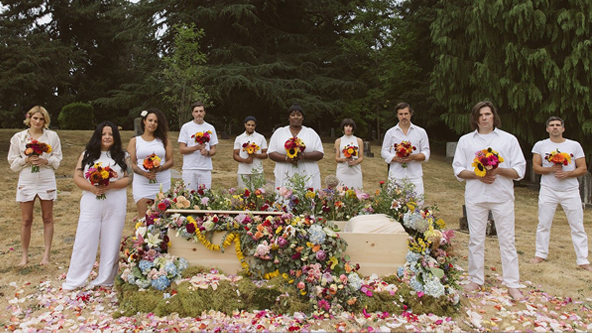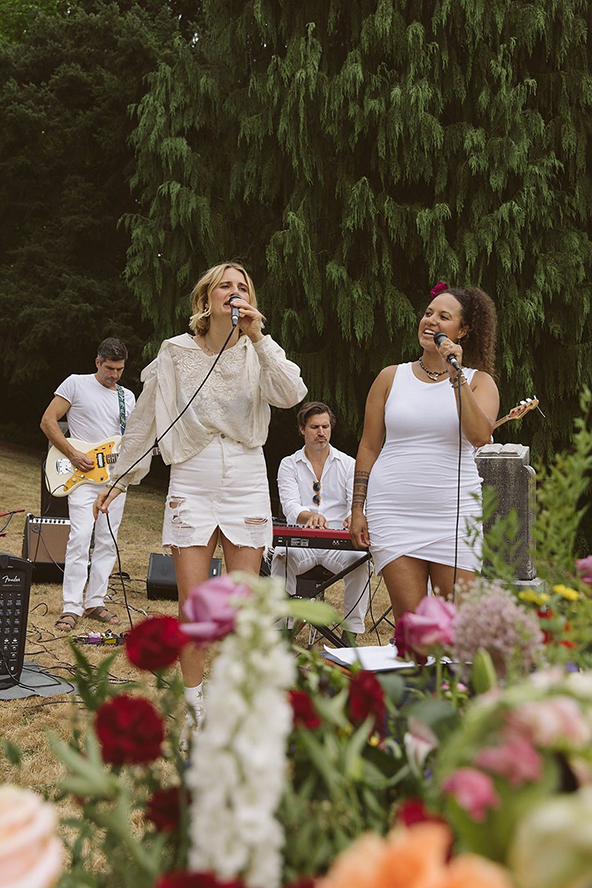‘Last Words’ Project Turns Letters Into Song

Crystal Meneses wears many hats. She’s a death doula, a chaplain for a local hospice organization, a music therapist, a death cafe facilitator, a grief counselor, a volunteer for several charities, and a transport worker for a mortuary.
But the Oregon native is also an artist and musician and the founder of Activate Art, a nonprofit working to bridge the urban-rural divide.
So perhaps it is not surprising that surrounded by death (she lost seven people close to her in 2014) and inspired by the power of art, she created the Last Words project.
The project began with four “altars” she placed near the Oregon Coast, set up to collect letters about loved ones who had died from the public.
There, she gathered about 75 letters from anonymous submissions to create songs she later performed with a 10-piece band at four Portland-area cemeteries.
Some letters were simple. “I miss you, Dad. Where are you?” read one. A child wrote, “Mom thinks I’m over you, but I’m not.”
Meneses was excited to bring live music to Oregon cemeteries, she believes, for the very first time. Though it was a custom 100 years ago for families to visit and take picnics at the cemetery, clean the tombstones, and hang out in the space, this practice has faded away. But part of her project's goal is to remember and value these spaces.
Her work in various roles within the death industry has shown her the value of opening conversations about death. And in her advocacy work, she’s become concerned about the isolation that some, especially those in poverty and without shelter, suffer. Her work has brought her to prisons and hotel rooms where not everyone gets to have what the privileged consider a “good death.”
Meneses’ goal was to raise money by recording the concerts and creating and then selling live albums, using the proceeds to fund Oregon’s first death doula care space to be used to care for houseless veterans in partnership with Do Good Multnomah and Embrace Death Doula Care.

Beyond the fundraising, she hopes to open conversations about death and build a community to take the fear out of the conversation.
For her, talking and thinking about death has been a “gift.” She says awareness of death can bring about “radical change” in life as it did for her. Her work as a therapist and an artist has helped her see the value in opening the door to the pain of grief and loss.
“Music and art make places of pain accessible,” she says, explaining that people can often hear music about death and grief, even if they can’t talk about it.
And though there is grief, there’s also love, as her lyrics convey in her song “Only Love.”
“I’m in the wind, I’m in the sky, I’m by your side when you cry. I’m in your eyes, I’m in your smile, I’m guiding you forever child.”
To learn more about keeping a positive outlook even after death, take a look at The Epic Impact of Gratitude, Even When Facing Life's Final Chapter.
Coping with Loss
Grief is complex, and no two journeys are the same. This guide offers insight into what you may experience and resources to help along the way.
- Apopka
- Auburndale
- Belleview
- Bradenton
- Brevard County
- Cape Coral
- Charlotte County
- Clewiston
- Cocoa Beach
- Collier County
- Daytona Beach
- Deltona
- Englewood
- Fort Myers
- Haines City
- Hendry County
- Hillsborough County
- Kissimmee
- LaBelle
- Lady Lake
- Lake County
- Lakeland
- Land O' Lakes
- Largo
- Lee County
- Manatee County
- Marco Island
- Marion County
- Melbourne
- Naples
- New Smyrna Beach
- North Port
- Ocala
- Orange County
- Orlando
- Ormond Beach
- Palm Bay
- Palm Coast
- Pasco County
- Pinellas County
- Polk County
- Port Charlotte
- Port Orange
- Punta Gorda
- Rockledge
- Sanford
- Sarasota
- Sarasota County
- Satellite Beach
- Sebastian
- Seminole
- St. Petersburg
- Sumter County
- Sun City Center
- Tampa
- Tavares
- The Villages
- Titusville
- Venice
- Volusia County
- Wildwood
- Winter Haven
- Winter Park
- Afton
- Andover
- Apple Valley
- Arden Hills
- Barnum
- Bayport
- Belle Plaine
- Bethel
- Big Lake
- Birchwood Village
- Blaine
- Bloomington
- Brooklyn Center
- Brooklyn Park
- Brookston
- Buffalo
- Burnsville
- Carlton
- Carlton County
- Carver
- Centerville
- Chanhassen
- Chaska
- Chisago City
- Circle Pines
- Cloquet
- Coates
- Cologne
- Columbia Heights
- Columbus
- Corcoran
- Cottage Grove
- Cromwell
- Crystal
- Dakota County
- Dayton
- Deephaven
- Delano
- Dellwood
- Duluth
- Eagan
- East Bethel
- Eden Prairie
- Edina
- Elko New Market
- Elk River
- Excelsior
- Falcon Heights
- Farmington
- Forest Lake
- Fridley
- Gem Lake
- Golden Valley
- Grant
- Greenfield
- Greenwood
- Ham Lake
- Hampton
- Hanover
- Hastings
- Hennepin County
- Hermantown
- Hilltop
- Hopkins
- Hugo
- Inver Grove Heights
- Jordan
- Lake Elmo
- Lakeland
- Lakeland Shores
- Lake Saint Croix Beach
- Lakeville
- Landfall
- Lauderdale
- Lexington
- Lilydale
- Lindström
- Lino Lakes
- Little Canada
- Long Lake
- Lonsdale
- Loretto
- Mahtomedi
- Maple Grove
- Maple Plain
- Maplewood
- Medicine Lake
- Medina
- Mendota
- Mendota Heights
- Miesville
- Minneapolis
- Minnetonka
- Minnetonka Beach
- Monticello
- Moose Lake
- Mound
- Mounds View
- New Brighton
- New Hope
- Newport
- New Prague
- New Trier
- North Oaks
- North St. Paul
- Nowthen
- Oakdale
- Oak Grove
- Oak Park Heights
- Orono
- Osseo
- Otsego
- Pine Springs
- Plymouth
- Prior Lake
- Ramsey
- Ramsey County
- Randolph
- Rockford
- Rogers
- Rosemount
- Roseville
- Saint Louis County
- Saint Louis Park
- Saint Mary's Point
- Savage
- Scandia
- Scanlon
- Shakopee
- Shoreview
- Shorewood
- South Saint Paul
- Spring Lake Park
- Spring Park
- St. Anthony
- St. Bonifacius
- St. Francis
- St. Paul
- St. Paul Park
- Stacy
- Stillwater
- Sunfish Lake
- Tonka Bay
- Vadnais Heights
- Vermillion
- Victoria
- Waconia
- Watertown
- Wayzata
- West St. Paul
- White Bear Lake
- Willernie
- Woodbury
- Woodland
- Wrenshall
- Alhambra
- Aliso Viejo
- Amador City
- Amador County
- American Canyon
- Anaheim
- Angels Camp
- Antioch
- Arcadia
- Artesia
- Auburn
- Baldwin Park
- Berkeley
- Biggs
- Bradbury
- Brea
- Brentwood
- Buena Park
- Butte County
- Capitola
- Carmel-by-the-Sea
- Carpinteria
- Chico
- Chino
- Claremont
- Colusa
- Compton
- Concord
- Contra Costa County
- Costa Mesa
- Covina
- Cupertino
- Cypress
- Davis
- Del Rey Oaks
- Diamond Bar
- Dixon
- Downey
- Duarte
- Dublin
- East Palo Alto
- El Dorado County
- Elk Grove
- El Monte
- Fairfield
- Fontana
- Fountain Valley
- Fremont
- Fullerton
- Galt
- Gardena
- Garden Grove
- Gilroy
- Glendora
- Gonzales
- Half Moon Bay
- Hayward
- Hollister
- Ione
- Irvine
- Irwindale
- Isleton
- Jackson
- Laguna Hills
- Laguna Niguel
- Laguna Woods
- La Habra
- Lake Forest
- Lakewood
- La Mesa
- La Palma
- Larkspur
- Lathrop
- Lincoln
- Livermore
- Lodi
- Los Altos
- Manteca
- Marina
- Martinez
- Milpitas
- Mission Viejo
- Modesto
- Monrovia
- Montclair
- Monterey
- Monterey County
- Monte Sereno
- Mountain View
- Napa
- Newark
- Norco
- Norwalk
- Oakdale
- Oakland
- Ontario
- Orange
- Orange County
- Orland
- Oroville
- Pacific Grove
- Palo Alto
- Pine Grove
- Pioneer
- Placentia
- Placer County
- Placerville
- Plymouth
- Pomona
- Rancho Cucamonga
- Rancho Santa Margarita
- Redwood City
- Richmond
- Rio Vista
- Ripon
- Rocklin
- Roseville
- Sacramento
- Sacramento County
- Salinas
- San Buenaventura
- San Carlos
- Sand City
- San Diego County
- San Dimas
- San Francisco
- San Gabriel
- San Joaquin County
- San Jose
- San Juan Bautista
- San Juan Capistrano
- San Leandro
- San Mateo
- San Mateo County
- Santa Ana
- Santa Barbara
- Santa Barbara County
- Santa Clara
- Santa Clara County
- Santa Cruz
- Santa Cruz County
- Santa Fe Springs
- Saratoga
- Scotts Valley
- Seaside
- Signal Hill
- Soledad
- Soquel
- South Gate
- South San Francisco
- Stanton
- Stockton
- Suisun City
- Sunnyvale
- Sutter County
- Sutter Creek
- Tehama
- Temple City
- Tracy
- Tustin
- Upland
- Vallejo
- Villa Park
- Walnut
- Walnut Creek
- Watsonville
- West Covina
- Westminster
- Whittier
- Willows
- Woodland
- Yorba Linda
- Yuba City
- Albany
- Amsterdam
- Beacon
- Canajoharie
- Clifton
- Englewood
- Fulton County
- Fultonville
- Garfield
- Garnerville
- Glen Cove
- Gloversville
- Hackensack
- Haverstraw
- LaFayette
- Montgomery County
- Newburgh
- New Rochelle
- New York
- Onondaga County
- Paterson
- Peekskill
- Rockland County
- Rye
- Schenectady
- Syracuse
- White Plains
- Yonkers
- Auburn
- Bellevue
- Bothell
- Brier
- Carnation
- Centralia
- Clyde Hill
- Duvall
- Edmonds
- Everett
- Federal Way
- Granite Falls
- Issaquah
- Kenmore
- Kent
- King County
- Kirkland
- Lacey
- Lakewood
- Langley
- Lewis County
- Lynnwood
- Marysville
- Medina
- Mercer Island
- Mill Creek
- Mountlake Terrace
- Mukilteo
- Newcastle
- Normandy Park
- Oak Harbor
- Oakville
- Olympia
- Pierce County
- Poulsbo
- Puyallup
- Redmond
- Sammamish
- Seattle
- Snohomish
- Snohomish County
- Sumner
- Tacoma
- Thurston County
- Tukwila
- Tumwater
- University Place
- Woodinville
- Woodway
- Adams County
- Arapahoe County
- Arvada
- Aurora
- Boulder
- Boulder County
- Brighton
- Castle Pines
- Cherry Hills Village
- Colorado Springs
- Commerce City
- Dacono
- Denver
- Douglas County
- El Paso County
- Evans
- Fort Collins
- Fort Lupton
- Fountain
- Glendale
- Golden
- Greeley
- Greenwood Village
- Jefferson County
- Lafayette
- Lakewood
- Larimer County
- Littleton
- Lone Tree
- Longmont
- Louisville
- Loveland
- Northglenn
- Parker
- Weld County
- Wellington
- Westminster
- Wheat Ridge
- Windsor
- Archdale
- Asheboro
- Belmont
- Bessemer City
- Burlington
- Charlotte
- Claremont
- Concord
- Conover
- Forsyth County
- Graham
- Greensboro
- Guilford County
- Hickory
- High Point
- Iredell County
- Kernersville
- King
- Lexington
- Locust
- Lowell
- Mecklenburg County
- Monroe
- Mount Holly
- Newton
- Randleman
- Rock Hill
- Salisbury
- Statesville
- Tega Cay
- Thomasville
- Trinity
- Winston-Salem